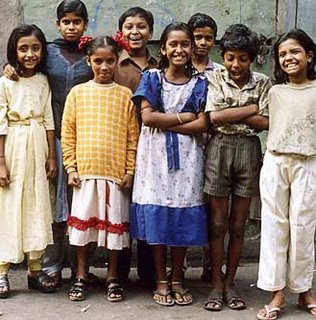 The children of Sonagachi (Golden Tree), the largest red-light district in Calcutta and the stars of "Born into Brothels"
The children of Sonagachi (Golden Tree), the largest red-light district in Calcutta and the stars of "Born into Brothels"These profound words are written by a ten-year old Avijitt (middle, rear), one of the stars of the2004 documentary Born into Brothels, which I watched today. It's an amazing tale of the death of a child's hope, documented by a New York photographer, Zana Briski. She documented the lives of children of the women "on the line," as prostitution is called in this country. While there, she gave cameras to children of the sex workers with astonishing results. The photos, which were widely distributed (there is a photo book by this name available on Amazon), are simply astonishing.
Avijitt is a particularly compelling child. He paints watercolors and is raised by his grandmother since his mother works on the line. His grandmother is able to see his abilities -- she proudly shows off a wall of ribbons he has won for his art. He is able to transfer his artistic vision to the camera, and remarks after he wins a place in a prestigious Amsterdam program for child photographers as he views a photo of a child taken by a young photographer from another country, "In this we are able to see the truth."
The truth for these children is bleak -- most of the girls will work "on the line" before they have reached puberty and the boys will probably turn to pimping, drugs and violence. Briski works to place the children into boarding schools where they can live a normal life, away from the beatings, drugs and prostitution.
Just before Avijitt is to go to Amsterdam then return to India to a boarding school, his mother is burned to death in a kitchen fire. (This is a notorious way in India of disposing of unruly women, whether they are wives or prostitutes. Often wives whose families can't afford to meet their dowry, which can increase after the marriage, are set afire. Kerosene is used in many kitchens and it's all too convenient to douse a woman in kerosene and ignite her. These deaths are almost never investigated by the police.)
Avijitt loses his desire to move forward, probably deeply disturbed by his mother's death. He finally, with Briski's help, obtains a passport, goes to Amsterdam then returns to India to boarding school.
The end of the film paints a bleak picture. Most of the girls leave the school, one by her own accord, several removed by their parents or aunts, presumably back to the red light district to work the line. A few manage to go on to school. The boys fare little better.
It's a powerful film, although it, too, has its critics. If you stand up, you make a good target, and this filmmaker is no exception.
If you like this film, there's another fantastic movie by Indian director Mira Nair, Salaam Bombay! Like Born into Brothels, it's a chilling look at the poverty-stricken lives of children of India. If you need a dose of gratitude, and some days we do, I highly recommend either of these two films.


No comments:
Post a Comment